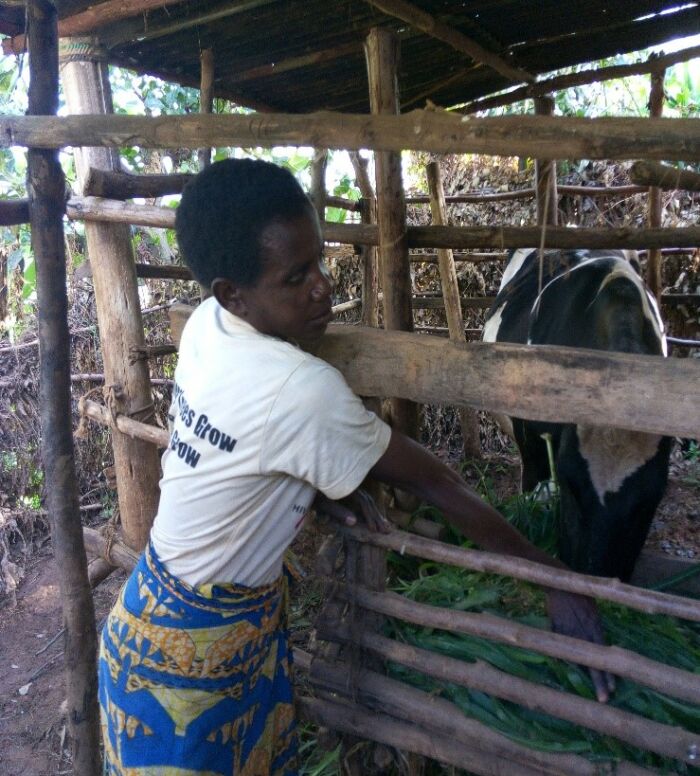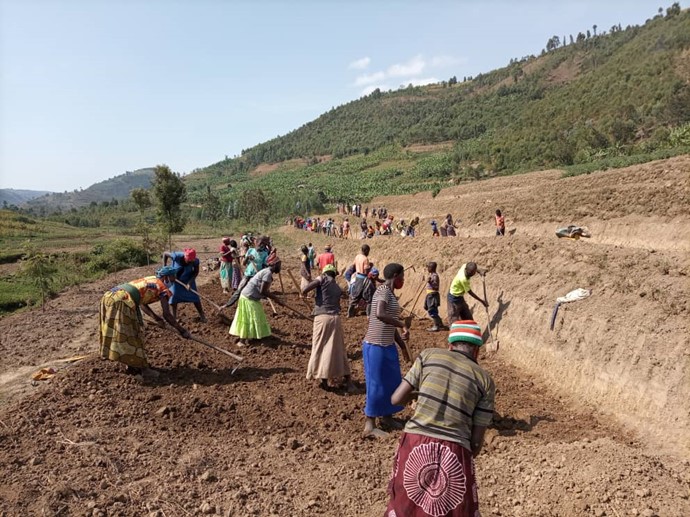 ‘’Before joining this cooperative, something was missing in my life and my life was not good. When I joined in 2015, we were trained on soil and water conservation and vegetable production. An idea came into my mind that I can grow vegetables for my family but also for selling. Now I have a vegetable garden business. Later I joined the village savings and loans association, and to be part of this group makes me happy because I managed to save money and buy a cow. I later got a loan and renovated my house. Now I am happy because I can pay school fees and school materials for my children and the health insurance for my family.’ Beatrice explains.
‘’Before joining this cooperative, something was missing in my life and my life was not good. When I joined in 2015, we were trained on soil and water conservation and vegetable production. An idea came into my mind that I can grow vegetables for my family but also for selling. Now I have a vegetable garden business. Later I joined the village savings and loans association, and to be part of this group makes me happy because I managed to save money and buy a cow. I later got a loan and renovated my house. Now I am happy because I can pay school fees and school materials for my children and the health insurance for my family.’ Beatrice explains.
In the picture: Beatrice NYIRABALIGIRA lives in Nyamiyaga cell, Kageyo sector, in Gicumbi District with her husband and five children. She is a member of the “Koperative Abizerwa Byumba” (KAB) cooperative. Photo by Vi Agroforestry.
Radical Terraces Construction
 Members of the “Koperative Abizerwa Byumba” (KAB) are learning how to construct radical terraces in the Ruvune Sector, in the Gicumbi District. The farms belong to cooperative members and serve as demonstration site on sustainable land management practices. Lime and compost are applied to increase soil fertility. Water trapping pits are also integrated in the farm to collect rain water where necessary.
Members of the “Koperative Abizerwa Byumba” (KAB) are learning how to construct radical terraces in the Ruvune Sector, in the Gicumbi District. The farms belong to cooperative members and serve as demonstration site on sustainable land management practices. Lime and compost are applied to increase soil fertility. Water trapping pits are also integrated in the farm to collect rain water where necessary.
In the picture: Terraces construction in Ruvune. Photo by Vi Agroforestry.
Village savings and loans associations are reopening
 Some districts of Rwanda, including the Gicumbi District have been in total lockdown where physical meetings have not been possible. Now, farmers are allowed to pick up activities again as long as they respect the covid-19 preventions measures put in place by the government.
Some districts of Rwanda, including the Gicumbi District have been in total lockdown where physical meetings have not been possible. Now, farmers are allowed to pick up activities again as long as they respect the covid-19 preventions measures put in place by the government.
In the picture: Members of Twizerane group in saving session in Kageyo Sector. Photo by Vi Agroforestry.
KAB cooperative members decided that the meetings in village savings and loans associations will be attended by not more than 15 members including leaders, halving the number of participants. The remaining farmers will be shifted in different meeting, yet remain part of the same associations they are in now.
Macadamia Enterprise in the Gicumbi district
To raise farmers’ income, KAB cooperative has set up macadamia enterprise near the office, to monitor the growing of that plant. This decision came after hearing that this macadamia farming offers an important source of income to smallholder farmers.
The site will be a demonstration site to encourage and interest other farmers. The seedlings will be sold and help KAB earn money for cooperative activities. Members will also be given training and taken in field days to learn more how macadamia seedlings are produced. Germination has started and pricking out will be on progressive basis.
Seedling production activities have started in 10 nurseries established in the area. Pricking out and tube potting activities have started for fast growing seeds, and they expect to plant them in September-October during the rain season.
More info about “Koperative Abizerwa Byumba” (KAB)
This cooperative is a result of joint efforts of farmer groups in the Gicumbi District. The cooperative started working with Vi Agroforestry in October 2014 and most members are involved in financial services through village savings and loans associations. KAB specializes in agroforestry, forestry and horticulture seedlings production. It now has 2 231 members, whereof 1 407 are women.
To date, the KAB cooperative has, with the support of Vi Agroforestry, constructed 125.5 ha of radical terraces and planted 1,250,352 trees in the Gicumbi District. Cooperative members have been trained and integrated sustainable agricultural land management practices on their farms. The members have also been supported with water harvesting tanks for water collection and storage for domestic use, and they have learned how to build improved stoves to reduce firewood use. In addition, most members have been supported in starting and running various enterprises trading fruits and livestock.
These activities carried out by KAB have had a positive impact on the lives and livelihoods of their members. Their yield has increased, and most members are now able to pay for Community Based Health Insurance and feed their family.
